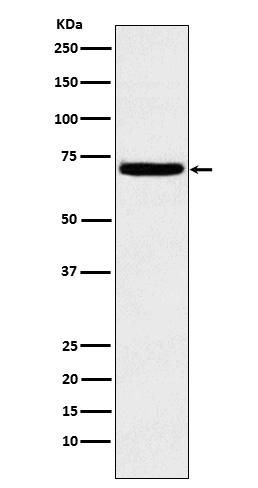
| WB | 1/1000-1/2000 | Human,Mouse,Rat |
| IF | 1/20-1/50 | Human,Mouse,Rat |
| IHC | 咨询技术 | Human,Mouse,Rat |
| ICC | 技术咨询 | Human,Mouse,Rat |
| FCM | 咨询技术 | Human,Mouse,Rat |
| Elisa | 咨询技术 | Human,Mouse,Rat |
| Aliases | HEP; Heparanase; Heparanase1; Hpa 1; HPA; Hpa1 HPR1; HPSE1; HSE1;;Heparanase |
| WB Predicted band size | Calculated MW: 61 kDa ; Observed MW: 70 kDa |
| Host/Isotype | Rabbit IgG |
| Antibody Type | Primary antibody |
| Storage | Store at 4°C short term. Aliquot and store at -20°C long term. Avoid freeze/thaw cycles. |
| Species Reactivity | Human,Mouse,Rat |
| Immunogen | A synthesized peptide derived from human Heparanase |
| Formulation | Purified antibody in PBS with 0.05% sodium azide,0.05% BSA and 50% glycerol. |
+ +
以下是关于Heparanase1(HPSE1)抗体的3篇代表性文献及其摘要概括:
---
1. **文献名称**:*Heparanase: A Key Enzyme in Invasion and Metastasis of Cancer Cells*
**作者**:Vlodavsky, I. et al.
**摘要**:
该研究系统综述了HPSE1在肿瘤微环境中的作用,强调其通过降解硫酸乙酰肝素促进癌细胞侵袭和转移。文中提到利用特异性HPSE1抗体抑制其酶活性,可显著降低肿瘤生长和血管生成,为癌症治疗提供新策略。
---
2. **文献名称**:*Monoclonal Antibody Against Heparanase Inhibits Tumor Metastasis*
**作者**:Zcharia, E. et al.
**摘要**:
研究者开发了一种抗HPSE1的单克隆抗体,并验证其特异性。实验表明,该抗体能有效阻断HPSE1的酶活性,在动物模型中抑制肿瘤细胞迁移和肺转移,提示其作为抗转移药物的潜力。
---
3. **文献名称**:*Heparanase-1 and Vascular Endothelial Growth Factor in Diabetic Complications*
**作者**:Li, J. et al.
**摘要**:
该研究探讨了HPSE1在糖尿病视网膜病变中的调控作用,通过抗体检测发现HPSE1表达与血管内皮生长因子(VEGF)水平正相关。抗体阻断实验表明,抑制HPSE1可减少血管异常增生,为糖尿病并发症治疗提供依据。
---
**备注**:若需更近期文献或具体应用场景(如诊断抗体开发),可进一步补充关键词(如“therapeutic antibody”或“diagnostic”)检索。
Heparanase-1 (HPSE1) is an endo-β-glucuronidase enzyme that cleaves heparan sulfate (HS), a key component of the extracellular matrix (ECM) and cell surface glycocalyx. By degrading HS, heparanase regulates ECM remodeling, facilitates cell migration, and releases growth factors and cytokines bound to HS chains, influencing processes like angiogenesis, inflammation, and metastasis. Overexpression of heparanase-1 is associated with tumor progression, autoimmune diseases, and diabetic nephropathy, making it a therapeutic target.
Heparanase-1 antibodies are essential tools for studying its expression, localization, and functional roles. These antibodies are widely used in techniques such as Western blotting, immunohistochemistry, and immunofluorescence to detect heparanase-1 in tissues or cell lines. Some antibodies inhibit enzymatic activity, enabling research into therapeutic interventions. Monoclonal antibodies targeting heparanase-1 are also explored for diagnostic applications, such as identifying heparanase-rich tumors, or for therapeutic use in blocking HS degradation to limit disease progression.
Despite their utility, antibody specificity and cross-reactivity with heparanase-2 (an inactive homolog) require careful validation. Ongoing research focuses on developing isoform-specific antibodies and optimizing their clinical applicability in cancer immunotherapy and anti-inflammatory therapies.
×